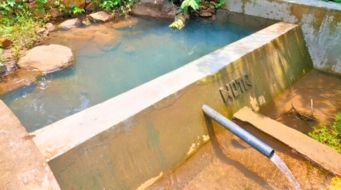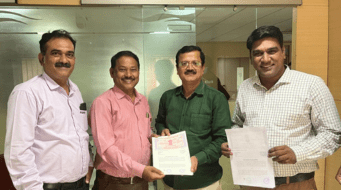Based on Data gathered up to September 2020
India is now among the three countries in the world to reach the bleak milestone of 100,000 deaths caused due to novel coronavirus after the United States and Brazil, and its epidemic shows no sign of abating. As COVID-19 pandemic continues to wreak unprecedented havoc, we at WOTR are working tirelessly to address the situation across our project villages.
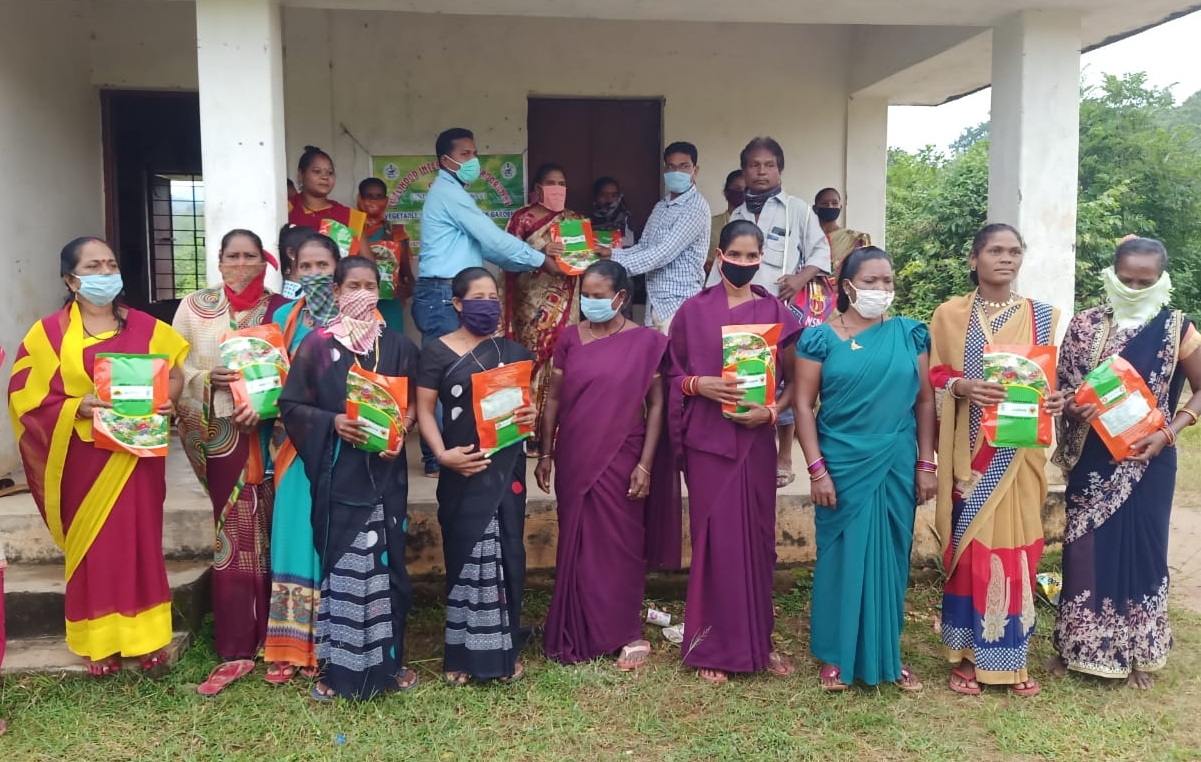
For WOTR, as an organisation with a mandate to work for the vulnerable, especially farmers and women, mobilising self-help capacities of individuals and communities is paramount. WOTR is uniquely placed to leverage its existing multi-sectoral infrastructure to respond to COVID-19 through various measures such as distribution of essentials, creating awareness, generating employment and livelihood support activities across seven states – Maharashtra, Telangana, Madhya Pradesh, Rajasthan, Odisha, Jharkhand and Chhattisgarh.
At the time we publish this report, COVID-19 has claimed the lives of over 102,000 people in India and infected over 7,300,000 However, this has not stopped WOTR’s commitment to the hundreds and thousands of families in rural India who are struggling to come to terms with the severe losses they have faced. WOTR is working to ensure they are not deprived of the critical support they need at this crucial hour.
Outreach

WOTR through its field team has ensured that awareness is created in the project villages on prevention and safety measures of the coronavirus, while also instilling the importance of wearing a mask and maintaining social distances at public places. The field team is also encouraging the local communities to support their action, guide them and motivate them in these challenging times.
WOTR is also fostering strong partnerships with the central and state governments, NGOs, community organisations, local civic bodies and other institutions to work on a collaborative model, streamlining best practices, promoting preparedness and building resilience. We are reaching out through our network of village-level workers – the Panlot sevaks, Jalsevaks, Mahila pravartaks, Village Development Committees and Self Help Groups.
WOTR is doing everything it can to support communities in its project areas to cope with COVID-19. According to data gathered until September 30, we have reached out to 124,510 households, 671 villages, 26 districts in seven states.
Communication/Awareness

In the month of September, WOTR has organised a second series of online workshops across seven states to provide crucial tips on how to deal with COVID-19, returning migrants, and the importance of keeping the villages in the COVID-19 Green Zone. This series was a follow up to another series of workshops organised in May.
Over 1,900 participants from 418 villages of the seven states came together for 26 online interactive workshops to talk about the situation due to the COVID-19 pandemic and express their concerns for the present and the future.
Since April 2020, 3,375 awareness sessions were organised by WOTR, impacting 166,104 people
76 structured and formal training sessions were attended by 3,606 participants, of which 2,196 were women and 1410 men. 437-gram panchayat members, 741 Village Development/Health Committee members, 1,382 SHG members, 348 community members, 584 Wasundhara Sevikas/Sevaks and 114 government officers attended the training sessions.
Employment / Livelihood

The magnitude at which the migrant families returned to their native villages due to the imposed lockdown caused by the pandemic has left tens of millions of migrant workers unemployment. There is a larger responsibility for the administration, civil society organizations and NGOs to provide adequate support for the returned individuals in terms of livelihood — providing employment opportunities and such.
WOTR has been working to generate employment especially for the returning migrants through its project activities like construction of check dams, farm ponds, stone bunds, digging of dugwell, etc. We are facilitating employment generation through MNREGA as well.
WOTR, along with MNREGA has created 374,867 labour days employing 21,974 labourers. 12,512 families have benefitted from labour since April 1. WOTR- MNREGA spent Rs 9.21 cr, post-April 1, in wages.
Migrant Returnees
The outbreak of the COVID-19 pandemic has forced many migrant workers from across the country to return to return to their native villages after nationwide lockdowns left them without an income. While there is a steady increase in the number of cases across the rural part of the country and given the poor health infrastructure in these parts, there may, in fact, be a rise in cases going forward.
Besides, providing a means of livelihood to the migrant returnees, WOTR has been keeping a record of the return migrant in its project villages.
As of September 30, 18,346 returning migrants have arrived in WOTR’s project villages of which 2,153 are in quarantine. We have provided support for 1,035 migrant returnees as of September 30.
Climate-Resilient Agriculture

WOTR has been working to make communities resilient to the climate crisis in its project areas. We are doing whatever it takes to mobilise support through our regional resource centres to tackle the challenges faced by farmers who are engaged in agricultural activities during this Kharif season begins.
We have been helping farmers adopt sustainable practices, so that, in time, they become resilient to extreme weather events triggered by the climate crisis — a regular occurrence in recent times.
Below is the list of few measures adopted by WOTR in its project villages
- SCI crops in 3,969 acres of 5,289 farmers
- SRI paddy in 1,087 acres of 1,328 farmers
- 14,581 farmers adopted organic formulations
- 2,358 farmers benefitted by composting
- 1,366 farmers adopted green manuring
- 3,181 farmers received seeds
- 1,737 acres under micro irrigation
As per data gathered up to September 30, we have helped 21, 677 farmers undertake plantation. Of which 3,223 farmers planted fruit species like Mango, Guava, Sapota, Custard Apple, Drumstick, etc. on 368 acres of land and 18,454 farmers planted forestry species like bamboo, gliricidia, banyan, bhendi, neem and many others on 818-acre area.
Apart from this, 41,472 saplings of various species were planted by individuals wherever possible making the total plantation of 125,338 trees in the season.
Weather-based crop advisories were issued to 16,113 farmers. 12,902 farmers are registered in the FarmPrecise mobile app developed by WOTR.
Distribution of Essentials
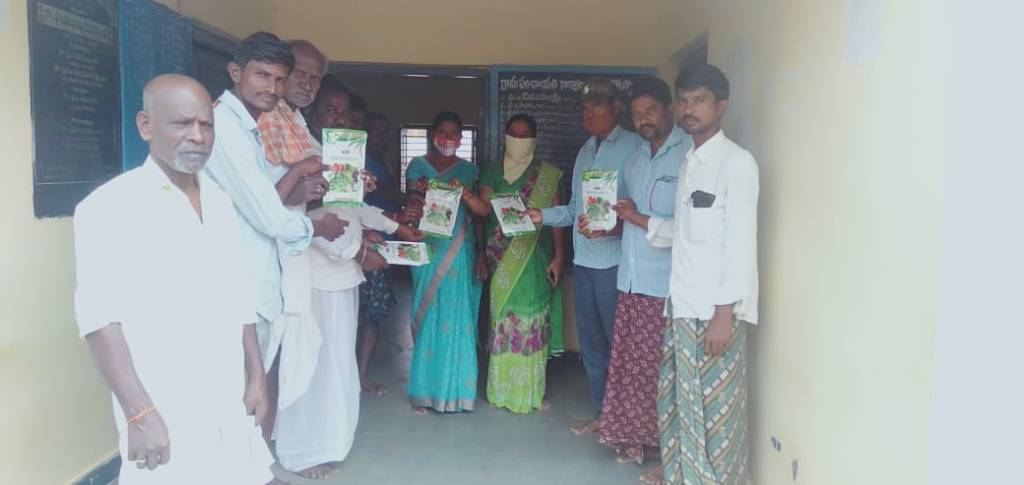
WOTR is assisting in the distribution of essentials and helping needy families who are struggling to get rations right from the outset. We have been working with families who need lifesaving hygiene essentials, carrying out awareness campaigns, helping in providing fact-based information, sewing and distributing masks and ensuring proper hand washing, besides supplying vulnerable families essential commodities.
Since early April, WOTR has distributed 9,815 grocery kits, 41,197 sanitary kits, and also provided 90,476 face masks made by 397 tailors.
Livelihood opportunities for rural women
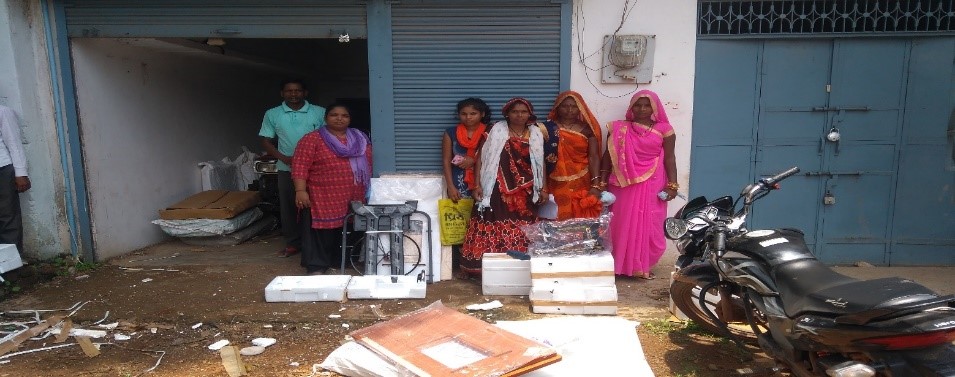
Reena Adivasi is a 30-year-old women from Pateriya Mal village in Damoh district of Madhya Pradesh who lives with three other family members. She used to work as an agricultural labour along with her husband Apart from the labour work she used to make bidis which was affecting her health.
She has a little knowledge and experience of sewing but she doesn’t have the means to do it. The COVID-19 pandemic has created the need for preparing protective face mask. When Reena got to know about WOTR’s project which aimed at enhancing livelihood options for landless farmer, she contacted Wasundhara Sevika, Rashmi Gond. Reena then submitted an application to the Village Development Committee stating her economical background and seeking for help.
Reena was then provided with a sewing machine which she used for prepaing mask and started to earn a livelihood from it. She now no longer need to work as a labour and even stopped making Bidi rolls. She later enhanced her tailoring skills from a sewing centre and is now sewing clothes for the villagers.
Many women like Reena have now quitted making bidis and are sewing clothes as a means of livelihood with the help of the sewing machine provided to them.
Sustenance Support

Multilayer farms and kitchen gardens are two major initiatives of WOTR. This is part of our programme to build resilience among rural communities to the unfolding climate crisis. WOTR has been assisting needy families who are struggling to get rations and distributing vegetables sourced from kitchen gardens Though both the activities kick started much before the onset of the pandemic, the initiatives have proved to be beneficial for small and marginalised farmers especially in rural Maharashtra when supply chains are largely cut off due to the pandemic.
As of September 30, 42,596 households have benefitted from 30,454 kitchen gardens and 1,240 multilayer farms.
Marketing Farm produce

The pandemic severely affected the farmers who are finding it increasingly difficult to sell their produce especially at the peak of the harvest season. WOTR has been facilitating the market linkage of farm produce goods to the city dwellers there by generating a means of income for many farmers.
In the states of Odisha Jharkhand, Maharashtra and Telangana 1,973 families have received support through FPOs selling over 12,895 quintals of rice, wheat, paddy, fruits and vegetables amounting to Rs 2.5 crore.
Community Mobilisation

Wasundhara Sevaks/Sevikas, Panlot Sevaks, Jal Sevaks and Mahila Pravartaks, who are our village level staff, along with Village Development Committees and Self Help Groups (SHGs) are together helping communities to adapt to the post-COVID-19 situation. They are providing whatever help the communities require to tide over the massive losses suffered by the villagers. They are also providing with lifesaving hygiene essentials, critical awareness campaigns, protective face masks and sanitization kits, besides essential supplies.
Since April 2020, 3,661 active personnel have been on the ground of which 2,076 are women.
Media coverage
WOTR’s response to COVID-19 has been extensively covered by the media. Until September 30, 42 news articles have appeared in local newspapers and 12 news stories in local television networks.
Acknowledgement
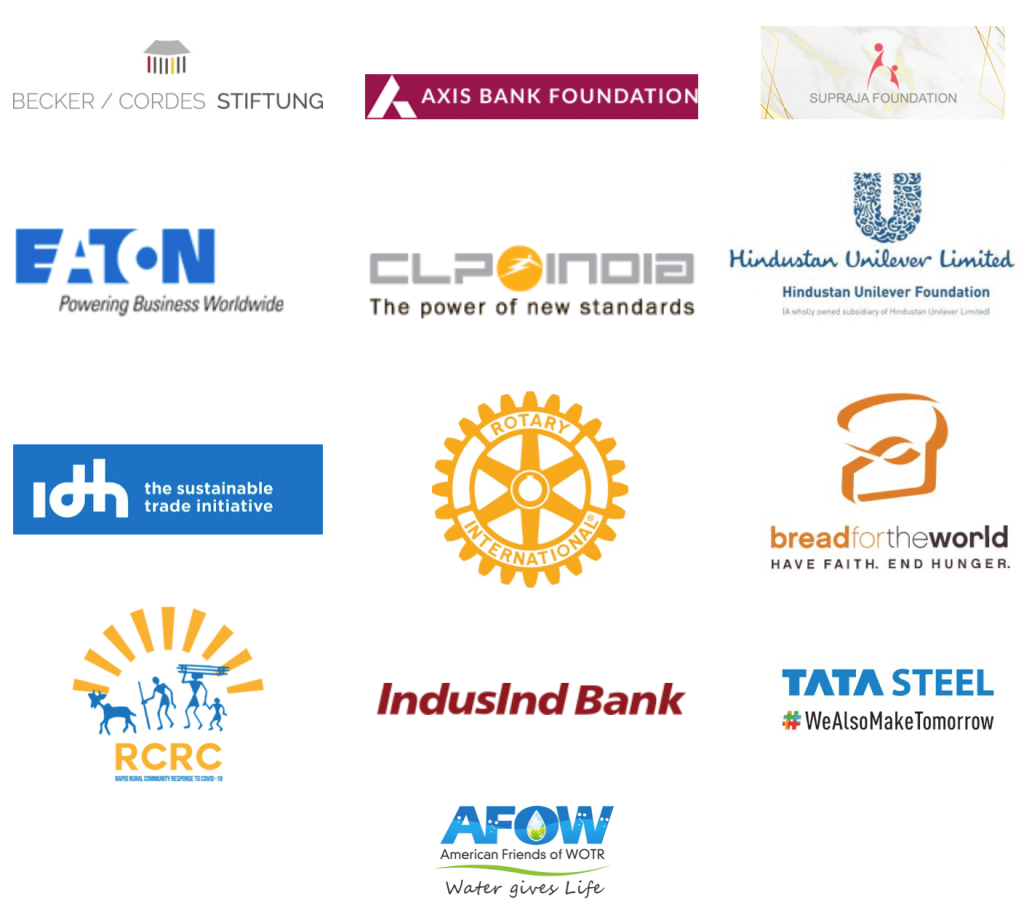
WOTR is grateful for the generous support of our donors, friends and colleagues who have made possible all of the above interventions. We would like to thank Becker-Cordes Stiftung, Bread for the World, EATON India Foundation, Education for Employability Foundation (E2F) through Rapid Community Response to COVID-19 Group (RCRC), Hindustan Unilever Foundation, IDH Sustainable Trade Initiative, IndusInd Bank Ltd, Andheri Hilfe-Bonn, AXIS Bank Foundation, Khandke Wind Energy Pvt. Ltd, Rotary Club of Pune, Supraja Foundation, Tata Steel Foundation and American Friends of WOTR, and WOTRians who have spontaneously contributed a part of their salaries.

